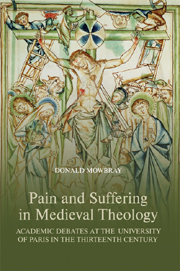 Pain and Suffering in Medieval Theology
Pain and Suffering in Medieval Theology Book contents
- Frontmatter
- Contents
- Acknowledgements
- Abbreviations
- Dedication
- Introduction
- 1 Thirteenth-Century Theological Ideas about Human Pain and Suffering and the Passion of Christ
- 2 Gendering Pain: Theological Ideas about Female and Male Suffering
- 3 Pain as a Restorative Power: Voluntary Suffering and Satisfaction for Sin
- 4 The Intellectual Development of Limbo: Pain, Children and Original Sin
- 5 Anima Separata: Masters of Theology and the Controversy surrounding the Suffering of the Separated Soul
- 6 Defining the Corporeal: Suffering in Hell according to Masters of Theology at Paris, c.1230–c.1280
- Conclusion
- Select Bibliography
- Index
1 - Thirteenth-Century Theological Ideas about Human Pain and Suffering and the Passion of Christ
Published online by Cambridge University Press: 12 September 2012
- Frontmatter
- Contents
- Acknowledgements
- Abbreviations
- Dedication
- Introduction
- 1 Thirteenth-Century Theological Ideas about Human Pain and Suffering and the Passion of Christ
- 2 Gendering Pain: Theological Ideas about Female and Male Suffering
- 3 Pain as a Restorative Power: Voluntary Suffering and Satisfaction for Sin
- 4 The Intellectual Development of Limbo: Pain, Children and Original Sin
- 5 Anima Separata: Masters of Theology and the Controversy surrounding the Suffering of the Separated Soul
- 6 Defining the Corporeal: Suffering in Hell according to Masters of Theology at Paris, c.1230–c.1280
- Conclusion
- Select Bibliography
- Index
Summary
Human bodily suffering
During the twelfth century, there was much speculation by intellectuals about the nature of the body and its relationship to the soul. Indeed, the relationship between soul and body has been called ‘one of the fundamental issues in medieval thought’. The scholastic Peter Abelard, for example, was interested in the resurrection of the body and the suffering in hell caused to souls when separated from the body. These pains he dismissed as mystical or spiritual, rather than literal or physical. Other theological inquiries explored the reasons for God's Incarnation, a tradition which was inspired by Anselm in his Cur Deus Homo (1095–8). In the mid-twelfth century, Peter Lombard also debated the nature of Christ's body in his book of Sententiae, but, unlike later commentators, he did not specifically deal with the notion of suffering, nor did he investigate the notion of the human body in isolation.
In the thirteenth century, the nature of discussion about the body and its suffering was very different from that in the twelfth century. There is, of course, one important reason for this: the works of Aristotle which discussed the nature of the body were not available in the West until the early part of the thirteenth century. It is clear that the reception of these works heralded profound changes for the study of theology and philosophy, and particularly in relation to ideas about the union between body and soul.
- Type
- Chapter
- Information
- Pain and Suffering in Medieval TheologyAcademic Debates at the University of Paris in the Thirteenth Century, pp. 13 - 42Publisher: Boydell & BrewerPrint publication year: 2009


